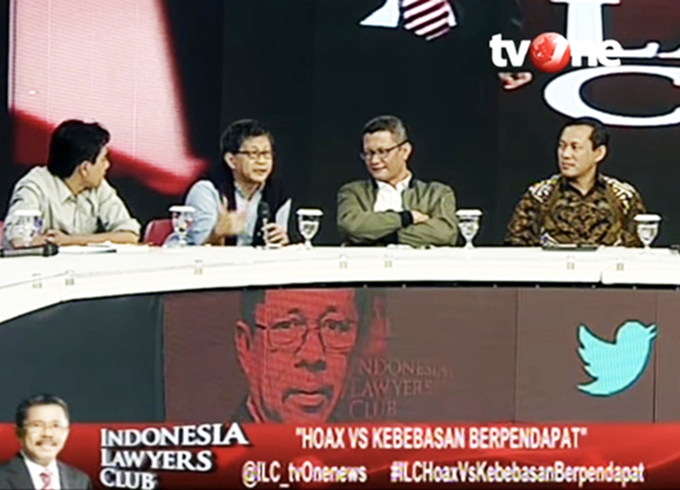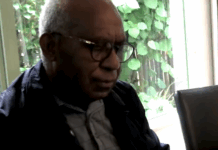
By Ainur Rohmah in Jakarta
Fake news and hate speech are inundating Indonesia on and offline with the country’s general election just two months away and with presidential candidates Prabowo Subianto and incumbent Joko Widodo locked in a contest for the top spot.
Jokowi, as the president is known, remains clearly in the lead with as much as 20 percent of the voters picking him despite his being the target of torrents of fake news, according to several recent surveys.
The Prabowo team claims the race is closer based on internal surveys – which they decline to share.
READ MORE: Meet the fake news trolls who influenced the US and Indonesian polls for money
A survey by the Indonesian Survey Institute (LSI) shows Jokowi and his partner, Islamic leader Ma’ruf Amin, with voter approval at 54.8 percent, while Prabowo and his running mate, businessman Sandiaga Uno, are well behind at 31.0 percent.
But in an example of the depth of misleading advertising, survey results of the Indonesian Telematics Society (Mastel) say nearly 45 percent of 1,116 respondents surveyed said they receive fake news and hoaxes every day.
Unfortunately, 30.3 percent of respondents say they have difficulty checking the truth of such reports, with more than 75 percent of respondents agreeing that false news can disrupt community harmony.
Political issues dominate the fake news transmissions, according to the survey, followed by misleading reports on religion and health.
Chat applications
They can take the form of photos, videos, and narratives, and are mostly distributed via social media (Facebook and Twitter) and chat applications such as Whatsapp.
Among Indonesia’s 265.4 million population, fully half or 132.7 million are internet users, based on research conducted by We Are Social, with almost all of them – 130 million – active social media users.
At least 192 million voters will select the president and their representatives in parliament simultaneously across the country on April 17.
The latest research by the social media monitoring site PoliticaWave found that hoaxes mostly target Jokowi.
“From the presidential elections in 2014 to 2019, it appears that Jokowi is a victim of political hoaxes,” said executive director PoliticaWave Jose Rizal at a press conference in Jakarta.
PoliticaWave also found that the numbers of hoax issues have been rising. The 10 biggest hoax issues relating to the 2019 election include a fake attack on activist Ratna Sarumpaet, who first accused the Jokowi camp of being behind it.
She later switched her allegiance to the president. Others deal with reports of very large government debt; allegations that several containers filled with ballots had been discovered as already cast for Jokowi; toll electronic transactions associated with debt to China; and fake e-KTPs from China.
Many accusations
Jokowi has been accused of being a member of the Indonesian Communist Party (PKI), of being a closet Christian, of using foreign consultants and of having a fake high school certificate.
Others include that 10 million workers from China have entered Indonesia; and that vice presidential candidate Ma’ruf Amin will be replaced by the former Jakarta governor Basuki “Ahok” Tjahaya Purnama, who was arrested on trumped up blasphemy charges that played an integral role in his defeat.
“The ten biggest hoax issues are aimed at attacking Jokowi,” said Yose.
Claiming that he was fed up with accusations and hoaxes against him, Jokowi in recent speeches has sought to clarify the various negative allegations and to go after his political opponents.
In early February, he hinted – without mentioning specifically – a campaign team that carried out so-called “Russian propaganda,” a name that has gained increased currency with spectacular charges over Russian interference in the 2016 US election.
The term is construed as an accusation against Prabowo’s camp.
“The problem is that there is a campaign team that prepares Russian propaganda which is (marked) at any time to issue a blast of slander and hoax,” Jokowi said while addressing thousands of supporters in the city of Surabaya.
Foreign consultants
Jokowi accused the Prabowo camp of hiring foreign consultants, who he said were only oriented to victory without considering that their strategy could potentially divide society. He also criticised the opposition for often accusing him of being pro-foreigners even though they themselves used the services of foreigners.
“Their consultants are foreign consultants,” he said. “Then who is the foreign stooge? Do not let us be treated continuously by lies. Our people are smart, whether in the city or in the village,” he said.
Gerindra deputy chairman Fadli Zon denied the allegations.
“We do not use foreign consultants. We can’t afford to pay (foreign consultants),” he said.
Prabowo’s team responded by accusing Jokowi himself of using the services of a foreign consultant named Stanley Greenberg. The accusation was based on an article on a website stating that Stanley had been a consultant to Jokowi.
“A note for all these inquiries,” Greenberg responded publicly. “I have never worked for Mr Widodo in any way. The website you mention is not accurate nor affiliated with me in any capacity.
“Accurate information on our past clients is listed on my official website,” Greenberg wrote through his Twitter account @stangreenberg, attaching his official website.
‘Russian propaganda’
The controversy about “Russian propaganda” also provoked the Russian Embassy in Jakarta to comment.
“We underline that Russia’s principal position is not to intervene in domestic affairs and electoral processes in foreign countries, including Indonesia which is our close friend and important partner,” wrote the Russian Embassy through its official Twitter account @RusEmbJakarta.
But Jokowi’s special team of Cakra 19 said it was convinced that “Russian propaganda” was now being applied in Indonesia, by adopting what is known as “firehoses of falsehoods,” an operation used by Russian hackers between 2012-2017 in the Crimea crisis, the Ukrainian conflict and the civil war in Syria.
“In Russia, this modus operandi has emerged as long ago as the 1870s through the Narodniki movement. This movement was used to bring down the Russian Czar by continually raising negative issues,” said the chairperson of the Cakra 19 team, Andi Widjajanto in a written statement.
“Operation blast of slander aims to make lies defeat the truth. This operation wants to destroy public trust in political authorities, including the media,” said the former Cabinet Secretary and defense expert.
Prabowo’s campaign team, known as the National Winning Agency (BPN), has launched allegations that the Jokowi government has used legal means to get rid of political opponents ahead of the upcoming election.
“Now people who have the potential to gain votes in the BPN circle have begun to be crushed one by one,” Gerindra Party general secretary Ahmad Muzani said.
Hate speech
He charged that a musician-turned politician, Ahmad Dhani, and a cleric leading the Movement 212 – a group of conservative Muslims who held a series of demonstrations against former Jakarta governor Basuki – named Slamet Ma’arif had been the target of what he called “criminalisation”.
Dhani was sentenced to 18 months in prison at the end of January on a charge of hate speech. Ma’arif members are now suspected of a series of alleged campaign violations.
Several other names in Prabowo’s camp were also involved in legal cases or even jailed. Muzani claimed the police were quick to investigate cases involving Prabowo’s sympathizers but not with cases involving or suspected of involving Jokowi’s supporters.
“We have submitted many reports (to the police), but it seems that there is not enough evidence. Whereas when our party was reported, (it was said) there was enough evidence. This is no longer inequality, it is bias,” Muzani said.
Presidential Chief of Staff Moeldoko denied Muzani’s allegations, emphasizing that the government did not intervene in the legal process.
“That there are (BPN members) who are entangled in legal matters, look to yourselves. It may be something that is wrong (with themselves). So don’t always blame the government,” Said Moeldoko as quoted by kompas.com












































